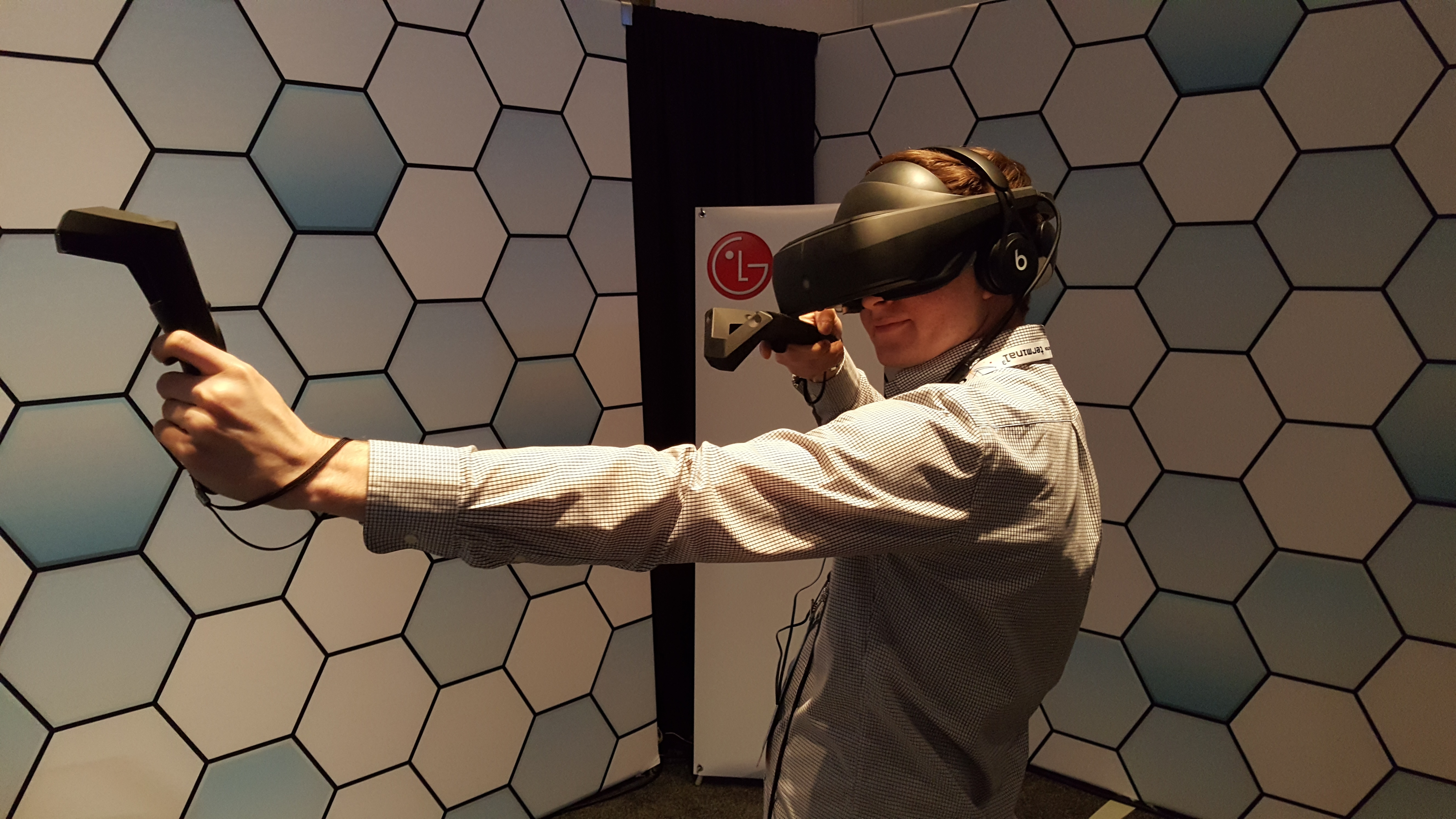LG's VR headset might be our new favorite
LG's headset may be the most comfortable VR headset, and with a high resolution OLED display to boot.

Valve announced a new VR headset on Monday without much detail. Or, really, any detail. All we knew: LG was making a headset, partnering with Valve the same way HTC did with the Vive, and it was a prototype meant to "deliver a high fidelity, next generation VR experience." No price, no hardware specs. Now we've gotten a chance to put the LG headset on our faces, and got a few important details from LG. The big one: higher resolution screens than either the Oculus Rift or the HTC Vive.
Here's what LG would tell us:
- 3.64 inch diagonal OLED display, with a resolution of 1440x1280 per eye
- 110 degree FOV with lenses at 12mm from your eyes, 120mm FOV with lenses at 10mm
- 90Hz refresh rate
- Final hardware will support IPD adjustment, but the dev kit did not
- Tracking works with the Lighthouse base stations, and the touch controller design is based on the Vive controllers (with the same thumbpads)
- Lenses are refractive rather than the fresnel lenses used by Rift and Vive
No word on price, and LG wouldn't say what its headset weighs, only that it's comparable to other headsets. We had a chance to try it on, and found the design closest to Sony's PlayStation VR. It's more comfortable than the HTC Vive, and definitely feels lighter, though that could be because the weight distribution is so much better.
LG's headset uses a firm supporting brace that loops around the back of your head, which can be loosened or tightened with a simple dial. At the front of the headset, there's a headrest that cradles the top of your forehead. You can conveniently get the headset on your head without having it over your eyes. There's a pivot point that allows the headset to angle upwards 90 degrees, so once you have it securely on your head, you snap the headset down and slide it forward until it's pressed snugly to your face. It takes a few seconds to understand the process of putting this headset on—it's a bit more involved than the Rift or the Vive—but it resulted in a clearer, more snug fit for me than either of those VR headsets.
The weight was also very well-supported. On the comfort scale, the LG headset definitely ranks much closer to the Oculus Rift than the Vive. One inconvenience: there's no integrated audio, so you'll still be wearing a pair of headphones or earbuds that make it a bit more complicated to get everything on your head.
It's really difficult to compare one headset display to another, and the LG headset is definitely not a quantum leap for VR, the same way moving from Oculus's DK2 to its later prototypes was. My quick impression was that it felt like a slightly larger field of view than the Vive, and a slightly clearer picture. It was definitely easier to get the display in focus thanks to LG's mounting mechanism.
PC Gamer EIC Evan Lahti also got a chance to try on the new headset, and this was his take:
I didn't have the benefit of comparing each headset side-by-side, but I was very impressed with LG's prototype. I need to see how it feels after an hour or more of use before drawing harder conclusions, but I did find it lighter and more comfortable than either the Rift or the Vive. The construction of the headset is similar to PlayStation VR, with the visor section mounted more independently at the front of the headset. When you're taking it off, you don't pull the whole device off your head like it's an enormous, interconnected mess of gear, basically. I also love the tightening dial mounted at the back of the headstrap, similar to the Vive Deluxe Audio Strap, where you can make minor adjustments to tightness. I'd want that feature in any headset I own.
Without more time with the headset, it's hard to tell how much the higher resolution displays matter, how much the OLED display's vibrant colors will affect the VR experience, or how LG"s lenses, which aren't the fresnel lenses we've seen in both PC headsets, affect clarity and focus. I'll need time to scrutinize. But from what I saw in just a few minutes, LG has build a headset on par with the competition, and this is just a devkit. If the final hardware is lighter and even more refined, paired with Valve's tracking solution and controllers, it'll definitely be the headset to own.
Keep up to date with the most important stories and the best deals, as picked by the PC Gamer team.
LG wouldn't give us a firm answer on when the final headset will be released, but said it will have more to share later this year.

Wes has been covering games and hardware for more than 10 years, first at tech sites like The Wirecutter and Tested before joining the PC Gamer team in 2014. Wes plays a little bit of everything, but he'll always jump at the chance to cover emulation and Japanese games.
When he's not obsessively optimizing and re-optimizing a tangle of conveyor belts in Satisfactory (it's really becoming a problem), he's probably playing a 20-year-old Final Fantasy or some opaque ASCII roguelike. With a focus on writing and editing features, he seeks out personal stories and in-depth histories from the corners of PC gaming and its niche communities. 50% pizza by volume (deep dish, to be specific).


